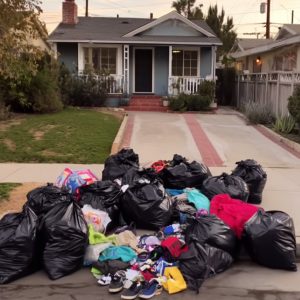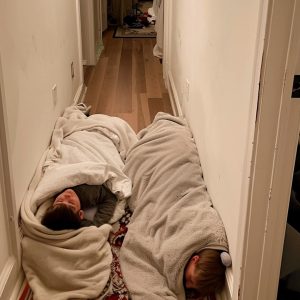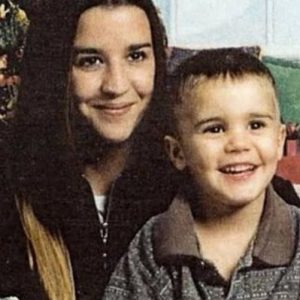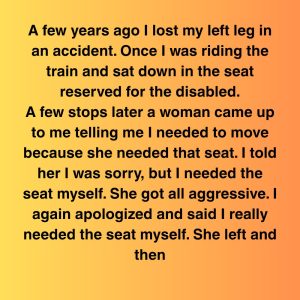It started with a golf cart ride on an ordinary Saturday.
The boys spotted it first. From the driveway, they saw the rumbling little cart bounce across the grass and screamed, “Can we go, pleeeease?”
The driver—a tall man with a scruffy beard, camouflage pants, and boots big enough to look like something out of a cartoon—slowed, tipped his head with a cautious smile, and called out, “Hop in… but only if Mom says yes.”
I hesitated. Everyone in the neighborhood knew of him, but hardly anyone knew him. He lived alone in the red-brick house three doors down, the one everyone assumed belonged to his parents. Whispers circulated about a rough military past and why he kept to himself.
But looking at my sons’ wide, pleading eyes, I ignored my gut and nodded.
Minutes later, their laughter echoed down the street as the golf cart rolled off toward the pond. Twenty minutes after that, they returned, windblown and grinning like they’d just ridden a roller coaster.
The next morning, two shiny toy trucks sat on our doorstep. The day after, he left Popsicles, then a small wooden birdhouse with my twins’ initials carved carefully into the roof.
It seemed harmless. I told myself maybe he was just lonely.
Then one night, as I tucked the boys into bed, my youngest whispered, “He cries sometimes when he drops us off… he tries to hide it.”
That stuck.
That evening, when the kids were asleep, I walked over and knocked on his door.
He opened it cautiously, looking surprised to see me there. He wiped his hands on an old cloth, nodded once, and stepped aside. “Ma’am,” he said softly. “Would you… like to come in?”
His house shocked me. I’d expected clutter or something grim, but it was warm and tidy. Family photos lined the hallway—two little boys smiling in baseball caps. One with a front tooth missing, the other clutching a glove bigger than his head.
I gestured to them.
“My nephews,” he said, his voice cracking on the word.
We sat at a worn kitchen table. He didn’t offer coffee; we just sat in silence until he spoke.
“They were six and eight,” he began, eyes on his hands. “I was overseas when my sister died. Car accident. I couldn’t get back in time… and their dad… just left after the funeral. They ended up in foster care.”
He swallowed hard.
“For nearly a year, I fought for custody,” he continued. “But they said I wasn’t stable. PTSD. Said I couldn’t provide what they needed.” He stared down at the table, his voice barely above a whisper. “I moved here thinking maybe they’d visit. Maybe I’d at least see them ride by. Stupid idea, huh?”
I shook my head, my throat tight. “No. It’s not stupid.”
He looked up then, his eyes glistening. “Your boys… they remind me of them.”
That night, I cried quietly in my kitchen. The next day, I explained to my twins that Mr. Daniels had been through a lot and missed people he loved.
From then on, he appeared more often. He fixed our leaning mailbox. On rainy days, he sat on our porch, teaching the boys to whittle tiny owls from scraps of wood. The three of them painted birdhouses together, streaking each other’s hands with blue and green paint.
For the first time since I’d noticed him, he smiled. Sometimes, he even laughed.
But not everyone liked it.
One morning, while I was planting tulips, my neighbor Sandra walked over. She lowered her voice and said, “I’d be careful. That man gives me goosebumps.”
“What’s he done to you?” I asked.
Sandra sniffed. “Nothing. But you know what they say about people with military issues.”
That night, anger simmered in my chest. People were so quick to judge. I’d seen nothing but patience and kindness from him with my kids.
The whispers got louder. One afternoon, a social worker knocked on my door.
“A caller expressed concerns about Mr. Daniels,” she said. “We’re just following up.”
I asked bluntly, “Is he under investigation?”
She shook her head. “No. Just… community anxiety.” She looked tired, drained. I gave her water before she left.
At the door, she added quietly, “From what I’ve seen, he’s done more good than harm.”
But the visit shook me.
That evening, I called Charlie. I told him maybe he should step back for a while.
There was a long pause before he replied softly, “Of course. I understand.”
When I hung up, it felt like I’d just kicked a loyal dog.
The twins were devastated. “But WHY?” they wailed. “We didn’t do anything!”
I had no answer other than that sometimes, people fear what they don’t know.
Weeks passed. Charlie’s porch light stayed dark. Birdhouses on his fence gathered dust. One Sunday, my daughter whispered, “I think he’s gone. He never answers anymore.”
I walked over and knocked. Silence.
But then, tucked behind the railing, I saw an envelope with my name.
Inside was a note, the handwriting shaky:
“Thank you for making me smile again. For a while, I felt like family. I’ll remember your kindness forever. I’m moving to Montana to work at a wildlife rescue. New beginnings. Tell the kids they brought me back to life. Love, Charlie Daniels.”
I read it twice, tears blurring the words.
The next morning, I showed the twins. They stayed silent for a long moment, then my youngest asked, “Can we write him back?”
We did. We sent drawings, letters, and a little acorn they carved together. I had no idea if it would ever reach him, but I prayed it would.
Months slipped by. Snow fell, melted, and fell again.
Then, one winter morning, a small parcel arrived without a return address.
Inside was a handcrafted birdhouse painted to look like our home. A little flannel-clad figure cradled a baby fawn near the door.
Daisy, the note read. “She sleeps in my lap sometimes. I thought of you.”
He wrote that the animals were healing him in ways nothing else ever had.
“I know now,” the letter said, “that just because I lost my boys doesn’t mean I don’t still have love to give.”
A year later, I packed the twins into the car for a “surprise trip.”
As we pulled into a Montana wildlife sanctuary, the boys gasped.
There he was—boots muddy, flannel shirt rolled up, broad smile breaking across his face as he waved.
The twins leapt from the car and ran to him. He bent down, laughing through tears as he scooped them up.
We spent three days feeding deer, watching eagles soar, and mucking stalls together. At night, we sat by a crackling fire while Charlie told stories—not of war or pain, but of hope, second chances, and learning to live again.
Before we left, he hugged me tightly and said, “I was ready to give up. But your family reminded me… the world isn’t done with me yet.”
I hugged him back, tighter than I expected.
When we returned home, I shared his story online in our neighborhood group—not out of spite, but because I wanted people to understand what fear and judgment had almost destroyed.
Messages poured in. Some from people I barely knew. Apologies. Regrets.
Sandra showed up with a pie. “I was wrong,” she admitted. “I judged him. I should’ve just… gotten to know him.”
Today, Charlie’s birdhouse hangs by the old oak in our yard. Every time the wind chimes beside it, I think of that golf cart ride that changed everything.
It reminds us that compassion spreads quietly, healing isn’t always loud, and sometimes all it takes to save someone’s life is saying yes to a stranger who just needs to feel like family again.





